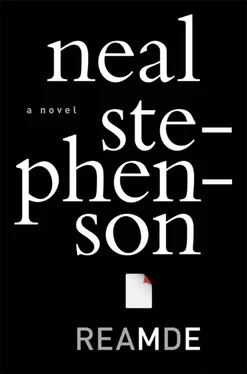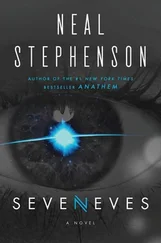Richard understood and acknowledged all of this—and did not care. “Did you, or did you not, tell me that this was all marketing? What part of your own statement did you not understand?” The purpose of the exercise was not really to build a rational, efficient airport security system. It was, rather (to use yet another of those portentous phrases cribbed from the math world), an existence proof. Once it was up and running, they could point to it and to its 100 percent success rate as vindicating the premise of APPIS, which was that real-world problems—especially problems that were difficult to solve because of hard-wired deficiencies of the human neurological system, such as the tendency to become bored when given a terrible job—could be tackled by metaphrasing them into Medieval Armed Combat scenarios, and then (here brandishing two searingly hip terms from high tech) putting them out on the cloud so that they could be crowdsourced.
The system, despite its bogosity—which was fundamental, evident, and frequently pointed out by huffy nerd bloggers—immediately became a darling of hip West Coast tech-industry conferences. APPIS had to be turned into a separate division and expanded onto a new floor of the office building in Seattle, which conveniently had been vacated by an imploding bank. New ideas and joint venture proposals rushed in, like so many wrong-way goblins, at such a pace that the APPIS staff could scarcely blow their Horns of Vigilance fast enough. The underemployed nerds of the world, impatient with the slow pace at which Corporation 9592’s in-house programmers bent to their demands, began to generate their own APPIS apps. The most popular of these was a system that would accept low-quality video of a corporate meeting room, supplied by a phone, and transmogrify the scene into a collection of hairy, armored warlords sitting around a massive plank table in a medieval fortress. Whenever a meeting participant lifted a bottle of vitamin water or a skinny nonfat latte to his or her lips, the corresponding avatar would quaff deeply from a five-liter tankard of ale and then belch deeply, and whenever someone took a nibble from a multigrain bar, the avatar would bite a steaming hunk of meat from a huge leg of lamb. PowerPoint presentations, in this scenario, were turned into vaporous apparitions hanging in numinous steam above a sorcerer’s kettle. In the first version of the app, the horn-helmeted avatars all said exactly the same things that the corresponding humans did in the real-world conference room, which made for some funny juxtapositions but wore thin after a while. But then people began to create add-ons so that if, for example, someone’s clever new proposal got trashed by a grouchy boss, the event could be rendered as a combat scene in which the hapless underling’s severed head wound up on the end of a spear. Large swaths of the global economy were, it now seemed, being remapped onto their T’Rain equivalents so that they could be transacted in a Medieval Armed Combat setting. Demonstrable improvements in productivity were being trumpeted every day on the relevant section of Corporation 9592’s website (by a medieval herald, naturally, and with an actual trumpet).
Richard insisted, only half in jest, that he wanted to see 10 percent of the global economy moved into T’Rain. Or at least 10 percent of the information economy. But since the information economy had now got its fingers into just about everything, this wasn’t much of a limitation. Factory workers watching widgets stream off the assembly line, inspecting them for defects, ought to be able to metaphrase their work into something way more neuron grabbing, such as flying up a river valley on a winged steed, gazing into its limpid waters at the rocks strewn up its channel, looking for the one that contained traces of some magical ore.
Which was also, as C-plus patiently explained, a ridiculous idea, since any machine-vision algorithm smart enough to convert a defective widget into an ore-containing boulder in a virtual river valley was smart enough to just sound a buzzer on the assembly line and flag the offending unit without involving human beings or virtual fantasy worlds. To which Richard responded, with equal if not greater patience, that he still didn’t give a shit because this was ultimately about marketing, and the crazy apps that random people on the Internet were writing were much better than anything he, Richard, could ever come up with.
Anyway, it had worked, after a shambling and chaotic fashion, and T’Rain had thus become far more intensively patched into the wiring diagram of the real world than a quasi-medieval fantasy world had any right or reason to be. Which was how they had ended up needing a calendar-and-contact-management app and diverse other add-ons that they had never dreamed of when they had been setting up the world ab initio.
Richard himself was not a user of the calendar app. He did most of his T’Rain questing solo, or in the company of one or two old friends, and so he didn’t need it; and the mere idea of needing to schedule his time that carefully made him dispirited. He used his phone for stuff like that, and the calendar app’s integration to the phone was clunky and not really worth putting up with. Even if it had worked, it just would have meant more crap showing up on his schedule, and fewer of the perfectly empty days that always gave him such a nice little endorphin rush when they appeared, as if by some act of divine grace, on his screen. Consequently, he was in no danger of being infected by REAMDE. And so, the morning after Peter and Zula had gone back to Seattle, when Richard woke up in his big, round, quasi-medieval bedchamber at the Schloss and checked his corporate email account, he was able to view the weekend’s spate of escalating SECURITY ALERT messages with some kind of detachment. There was a new virus; it was called REAMDE ( sic ), which was an accidental or deliberate/ironical misspelling of README; it had been simmering for a few weeks now, and in the last few days it had gone exponential, as these things commonly did. It was a consequence, really, of APPIS, and of all Richard’s efforts to turn T’Rain into a Profit Center above and beyond the mere world of hard-core gamers. As such, it was perfectly all right from a business and marketing standpoint; it would only generate stories in the tech press about how T’Rain had made the jump from a mere niche product for the prohibitively geeky to a business productivity app that mundanes felt that they had to have, along with their Excel and their PowerPoint, and Richard could already predict that at their next quarterly meeting they would see, in retrospect, a surge in sales precisely tracking the spike in free publicity generated by the advent of this terrible virus.
His calendar was clear for today, but prophesying a journey to Seattle tomorrow so that he could get up early on the following morning for another one of his whirlwind journeys to Nodaway and the Isle of Man. He considered using this REAMDE thing as a pretext for going to Seattle now, a day early. And he might have done just that, if more time had elapsed since his last interaction with Zula. But she had only just left, and he didn’t want to creep the poor girl out by turning into some kind of hovering stalker-uncle. Better for her to decide on her own that she was ready for a little more Richard time. So he left his schedule alone, reckoning he’d be busy all day anyway, with emails from friends and family members whose personal files were being held hostage by some mysterious troll on the Internet.
THERE WAS NO coming awake but a gradual reassembly of consciousness from parts that, while still functioning, had come unlinked. She was looking down on snow-spackled mountains as though seeing them in the opening screen of T’Rain and, at the same time, having a dream of walking barefoot through them. For it was barefoot that she and her group had walked most of the way from Eritrea to Sudan, and her dreams often took her back to that journey, as though the nerves in the soles of the feet were connected more tightly to the brain than any others. In her dream, the snow on the mountains was warm between her toes, which she knew made no sense; but it was explained as some magic that had been dreamed up by Devin Skraelin based on an oblique reference by Donald Cameron. And then she and Pluto had been given the job of making it real, rendering it from bits, and she was walking across it with a caravan of Eritrean refugees to make sure that it all held together.
Читать дальше





